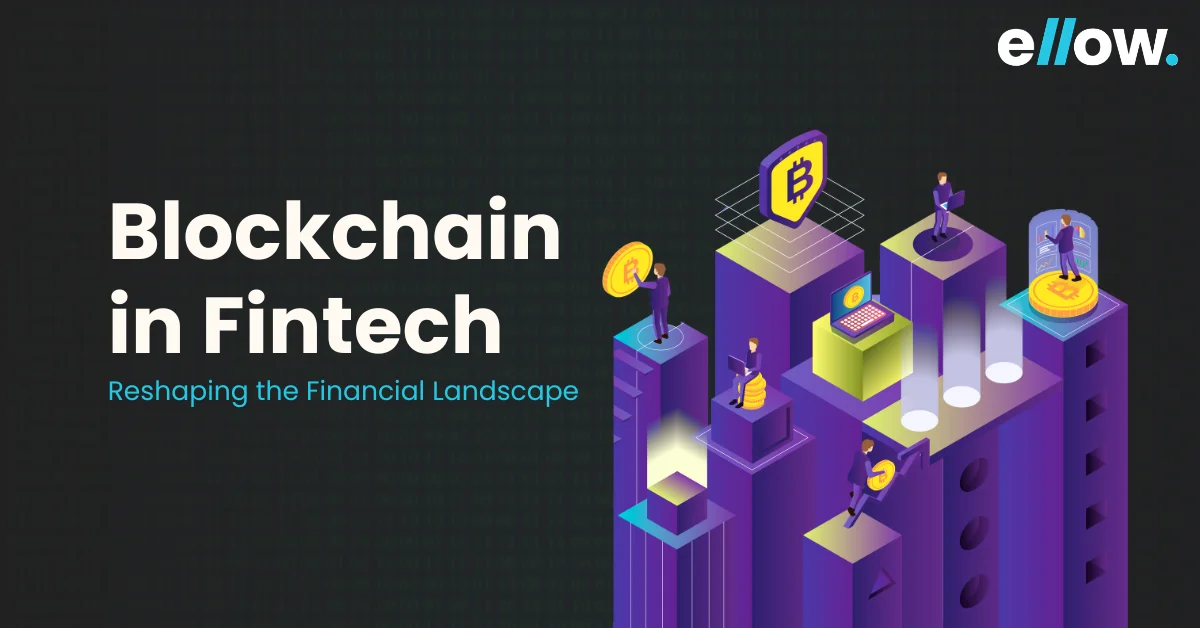Let’s build the future together.
Great ideas need great people. Partner with us to bring your vision to life, or take the first step in your career by joining our team of innovators.
Receive new articles delivered Straight to your inbox

The financial technology (fintech) industry is booming, constantly innovating ways to manage and process our money. New SAAS technologies are popping up daily, and blockchain technology is emerging as a game-changer.
Blockchain, the secure digital ledger behind cryptocurrencies, is poised to revolutionize fintech. Experts predict the fintech blockchain market will reach a staggering $36.04 billion by 2028.
This surge reflects the potential of blockchain to boost revenue, improve user experience, streamline processes, and enhance security for both businesses and consumers.
Decentralized Finance (DeFi) is a prime example, leveraging blockchain to reduce reliance on traditional banks and empower individuals with more control over their finances.
FinTech Blockchain is the fusion of financial technology (FinTech) with blockchain technology. FinTech uses modern technology to improve financial services, while blockchain is a decentralized, distributed, and transparent digital ledger technology.
In FinTech Blockchain, decentralized finance (DeFi) plays a crucial role. DeFi utilizes decentralized smart contracts to offer financial services without the need for traditional intermediaries like banks. This allows for greater accessibility, transparency, and efficiency in financial transactions.
Major financial institutions have begun investing in blockchain research and development for their operations, recognizing the potential benefits it offers. This indicates that FinTech and blockchain are not opposing forces but can work together to enhance financial systems. One of the key features of FinTech Blockchain is its ability to provide security and freedom through its decentralized nature.
By eliminating the need for intermediaries, such as banks, FinTech Blockchain enables individuals to directly engage in financial activities using digital currencies like stablecoins.
Overall, FinTech Blockchain represents a new frontier in finance, offering innovative solutions that can revolutionize the way financial services are accessed and utilized.
The finance industry, despite numerous technological advancements, remains centralized, raising doubts among users about its efficacy. In response, Blockchain technology has emerged as a transparent solution, revolutionizing fintech by offering decentralization. This shift has prompted startups and financial service developers to explore blockchain’s potential in reshaping the industry.
Blockchain, essentially a digital ledger, operates as a decentralized database where transactions are recorded across multiple computers securely and transparently. This ensures that no single entity controls the data, enhancing trust and reducing the risk of fraud.
According to a report by PwC in 2017, fintech companies are increasingly recognizing the potential of blockchain, with 77% of them expected to adopt the technology by 2020. Additionally, Forbes’ Blockchain 50 list highlights the significant impact blockchain is making across various industries, including finance.
Blockchain technology offers several benefits to the fintech sector. It enables faster and cheaper cross-border transactions, eliminates intermediaries, enhances security through encryption and consensus mechanisms, and provides transparent and immutable record-keeping.
Moreover, blockchain facilitates smart contracts, which are self-executing contracts with the terms of the agreement directly written into code. This automation streamlines processes reduces administrative costs, and minimizes the risk of errors or disputes.
As fintech companies embrace blockchain, they are reshaping traditional business models and operating processes. This includes developing blockchain-based payment solutions, digital identity verification systems, tokenization of assets, and decentralized finance (DeFi) platforms.
Overall, blockchain technology is optimizing fintech by increasing efficiency, transparency, and security while reducing costs and reliance on intermediaries. As the industry continues to evolve, blockchain is expected to play a central role in shaping its future landscape.
Check this video out: Blockchain in FinTech
Challenges like missed targets, prolonged fundraising cycles, and increasing losses are common in the fintech industry, often due to mismanagement. Here is how blockchain technology can tackle these challenges:
Fintech systems and transactions often rely on third-party approval, causing delays and dependence on higher authorities. Blockchain technology revolutionizes this process by decentralizing transactions. Instead of a single authority, transactions are confirmed by a network of nodes, reducing the need for centralized control.
This empowers users with faster confirmations and greater control over their transactions, ultimately decreasing reliance on centralized entities and enhancing the efficiency of the fintech ecosystem.
Users often feel unsure about what happens behind the scenes, leading to confusion and fear of identity theft. Blockchain solves this by being transparent and unchangeable, meaning every transaction is visible and cannot be altered. This builds trust because users can see exactly what’s going on, boosting confidence in the process and reducing concerns about security breaches or fraudulent activities.
Traditional fintech processes involve multiple intermediaries, causing delays and dissatisfaction among users. Blockchain technology addresses this by removing intermediaries and speeding up transactions.
Without the need for third parties, transactions become more direct and efficient, reducing processing times significantly. This improvement leads to higher user satisfaction and smoother business operations. Overall, blockchain’s ability to streamline processes by eliminating unnecessary steps makes it a valuable solution for the fintech industry, enhancing efficiency and customer experience alike.
Operational costs are a significant concern, often attributed to the involvement of multiple intermediaries and lengthy processes. Blockchain technology addresses this challenge by streamlining operations and reducing dependencies on intermediaries. By making transactions public and decentralized, blockchain minimizes the time and resources required for financial transactions.
This results in a notable cost reduction, estimated to be nearly 50% according to Appinventiv, a leading technology blog. Ultimately, embracing blockchain technology in fintech not only enhances efficiency but also significantly cuts down on operational expenses, making financial services more accessible and cost-effective for users.
Fintech services face limitations due to regulations and technical barriers, hindering access for users in certain situations. For instance, users may encounter obstacles when traveling or due to a company’s lack of physical branches or remote support. Blockchain technology resolves these issues by decentralizing operations, allowing fintech companies to provide services globally, 24/7.
With decentralized applications, cryptocurrencies, and smart contracts, users can access financial services from any location without traditional constraints. This ensures uninterrupted availability and convenience for users, overcoming the limitations imposed by regulatory and technical barriers in traditional fintech systems.
One of the major challenges in fintech is ensuring robust data security and safeguarding customer privacy against both external cyber threats and internal vulnerabilities. The financial sector, particularly fintech, is highly susceptible to cybercrime, reporting 2,527 incidents in 2021 alone. Blockchain technology combats cybersecurity risks and fraud through its decentralized nature, making it resistant to breaches with no single point of failure.
Transactions are encrypted and validated by a network of nodes, ensuring data integrity and confidentiality. Additionally, blockchain’s immutability feature prevents unauthorized modifications, enhancing data tamper-resistance and overall security for fintech operations. According to Statista, the financial sector remains highly vulnerable to cyber incidents, underscoring the importance of adopting blockchain for enhanced security measures.
tracking transactions is challenging due to centralization and complex intermediaries, leading to transparency issues and risks of tampering. Blockchain technology addresses this by utilizing a distributed ledger and consensus mechanisms. Each transaction is recorded across a network of nodes, ensuring transparency and traceability.
This decentralized approach enables users to easily verify transactions and auditors to monitor fintech activities effectively. With blockchain, the entire transaction history becomes publicly available, enhancing trust and accountability within the financial ecosystem.
Blockchain technology is revolutionizing various sectors within the fintech industry, offering innovative solutions and enhancing efficiency across different domains.
Traditional banking systems often suffer from bureaucratic inefficiencies and opaque processes, especially in clearing and settlement. By implementing blockchain technology, financial institutions can streamline transactions through decentralized consensus algorithms, leading to faster and more cost-effective clearing and settlement processes.
Accenture estimates potential savings of up to $10 billion in the banking sector through blockchain adoption. Moreover, blockchain facilitates peer-to-peer payments and digital currencies, reducing transaction costs and improving security.
Trade finance traditionally relies on cumbersome paperwork and lengthy processes for document verification and settlement. Blockchain integration simplifies trade processes by providing a decentralized platform for transaction verification and optimization, reducing risks, speeding up settlement, and enhancing trade accuracy.
Blockchain enables transparent and efficient lending processes in the financial sector by allowing borrowers to use crypto assets as collateral for obtaining fiat-based or stablecoin loans. This novel approach to lending offers flexibility and accessibility for borrowers while providing opportunities for lenders to earn interest on their assets.
Blockchain technology helps fintech companies improve regulatory compliance by providing transparent and immutable records of transactions. By tracking and recording verified transactions on a decentralized ledger, blockchain streamlines regulatory processes, reduces errors, and lowers the time and cost of auditing and accounting.
Blockchain offers a secure and standardized digital identity system, reducing the risk of fraudulent accounts and enhancing security for financial transactions. Through blockchain-based digital identity solutions, users can manage and share identity data securely, digitally sign documents, and connect with financial services globally.
Blockchain simplifies the auditing process by providing a transparent and immutable ledger for recording and verifying transactions. This streamlined approach allows auditors to access real-time data, reducing complexity and improving efficiency in financial audits.
Blockchain facilitates innovative crowdfunding models, such as Initial Coin Offerings (ICOs) and Initial Exchange Offerings (IEOs), which offer transparent and efficient fundraising opportunities compared to traditional models. These blockchain-based crowdfunding platforms provide access to a global pool of investors, accelerating fundraising processes and increasing transparency.
As blockchain continues to evolve, its integration into fintech applications is expected to drive further innovation and efficiency, revolutionizing traditional financial services and paving the way for a more inclusive and accessible financial ecosystem.
Blockchain technology offers numerous advantages in the realm of finance, revolutionizing traditional practices and enhancing efficiency and security.
Blockchain fosters transparency by establishing shared protocols and processes among network participants, ensuring data integrity and facilitating faster transaction processing, thereby improving overall customer experience.
Blockchain implementation in finance ensures robust security by employing tamper-proof application code, making it highly resistant to manipulation or hacking attempts by malicious third parties, thus enhancing the overall security posture of financial systems.
The immutable and transparent nature of blockchain ledgers instills trust among various stakeholders within a business network, enabling seamless data collaboration, management, and agreement facilitation, thereby enhancing overall trust and reliability in financial transactions.
Blockchain technology provides advanced tools for data privacy across different software layers, enabling selective data sharing within business networks while maintaining confidentiality and privacy, thereby striking a balance between transparency and data protection.
Blockchain supports the creation and execution of smart contracts, which are tamper-proof software facilitating automated business logic. This enhances programmability, efficiency, and trust within financial transactions, leading to streamlined processes and reduced operational overheads.
Blockchain networks in finance are designed for high performance and scalability, capable of sustaining hundreds of transactions per second. This includes hybrid and private networks engineered to support interoperability between public and private chains, ensuring resilience and global reach for businesses leveraging blockchain technology.
Blockchain technology is revolutionizing various aspects of the fintech industry, offering innovative solutions to traditional financial services. Here are some of the top use cases of blockchain in fintech:
Blockchain facilitates seamless digital payments through features like domestic wholesale settlements, tokenized currencies, and cross-border transactions. Fintech companies leverage blockchain to offer secure and low-cost payment solutions to users worldwide, enhancing financial inclusivity and accessibility.
Real-world examples: Coinbase allows businesses to integrate cryptocurrencies for payments, offering users the ability to buy, aggregate, and transfer digital assets freely.
Decentralized finance (DeFi) platforms enable peer-to-peer trading without intermediaries, ensuring secure and transparent transactions. From decentralized exchanges to margin trading, blockchain-powered trading platforms offer users greater control over their assets and improved liquidity.
Real-world examples: Uniswap is a decentralized exchange facilitating peer-to-peer trading, while Pax Gold tokenizes physical gold, making gold investment more accessible.
Blockchain-based digital identity solutions streamline Know Your Customer (KYC) processes, enhancing security and privacy. Users can control their identity data and share only the necessary information for specific transactions, reducing the risk of fraud and identity theft.
Real-world examples: Tradle and Civic provide blockchain-based digital identity solutions, helping fintech companies comply with KYC regulations while prioritizing user privacy.
Blockchain-powered lending platforms offer faster and more accessible loan options to both lenders and borrowers. Through crypto-backed loans and peer-to-peer lending, fintech companies leverage smart contracts to automate loan processes and improve credit approval times.
Real-world examples: SALT Lending allows borrowers to obtain loans using cryptocurrency as collateral, while Upstart offers P2P lending alternatives to traditional credit cards and loans.
Blockchain enhances asset and stakeholder management processes for capital markets, private equity firms, and real estate funds. By digitizing portfolios, automating funds, and ensuring transparent transactions, blockchain solutions optimize asset management and improve market access.
Real-world examples: Bankex specializes in tokenizing real-world assets like commodities and real estate, enabling fractional ownership and increased liquidity in traditional financial markets.
Blockchain technology continues to reshape the fintech landscape, offering transformative solutions that improve efficiency, security, and accessibility across various financial services.
We.trade, a platform developed by IBM in collaboration with major European banks like CaixaBank, HSBC, Nordea, and KBC, utilizes blockchain technology to provide a single database for trade transactions. This enhances transparency and security by allowing all counterparties to access the same information.
Circle offers a fintech solution allowing users to invest in various cryptocurrencies, including Bitcoin, Stellar, Ethereum, Zcash, Litecoin, EOS, and Monero. The company’s mobile application provides easy access to stock investments, cryptocurrency trading, and more without additional fees.
Robinhood disrupts the fintech ecosystem with its mobile application, enabling users to invest in stocks, cryptocurrencies, and other assets without fees. Additionally, Robinhood launched a crypto platform in 2018, allowing users to buy and sell digital currencies like Bitcoin, Ethereum, Litecoin, and Dogecoin.
CryptoPay provides blockchain-based payment solutions, allowing users to convert bitcoins into fiat currencies, send money to friends, or obtain prepaid debit cards for purchases. This offers users currency exchange flexibility and protects against market fluctuations.
LAToken is a crypto trading platform facilitating global bitcoin trading, asset tokenization, and initial coin offerings (ICOs). It bridges the gap between traditional and crypto economies, offering diverse investment opportunities.
Ripple utilizes blockchain to enable fast and low-cost cross-border payments through its payment protocol, XRP Ledger. This reduces reliance on traditional banking networks and enhances transaction efficiency for financial institutions.
Chainlink enhances smart contract reliability by connecting blockchain networks with real-world data sources. This ensures smart contracts have access to accurate information for executing complex financial agreements.
Veem streamlines global payments for businesses using blockchain technology. It offers secure and cost-efficient cross-border transactions with real-time tracking and simplified reconciliation processes, eliminating the need for intermediary banks.
Celsius Network provided decentralized lending and borrowing services using blockchain technology. However, the company faced bankruptcy in 2022 due to mismanagement during the cryptocurrency boom. Despite its downfall, Celsius Network showcased blockchain’s potential in various financial sectors, particularly lending markets.
Talking about the future of blockchain in fintech, the adoption of this technology is on a steep rise. The use of blockchain in fintech is gaining momentum, with significant growth projected in the coming years.
According to Market Research Future, the blockchain-based fintech market is expected to reach a valuation of USD 6700.63 million by the year 2023, with a remarkable compound annual growth rate (CAGR) of 75.2% during the forecast period.
This growth trajectory signifies the increasing recognition of blockchain’s potential to revolutionize the finance industry. As more financial institutions and fintech companies embrace blockchain technology, we can anticipate enhanced efficiency, transparency, and security across various financial processes.
From payments and remittances to asset management and smart contracts, blockchain is poised to reshape the landscape of financial services, driving innovation and unlocking new opportunities for businesses and consumers alike.
While blockchain technology holds promise for revolutionizing the fintech industry, it is still in its early stages of development. Fintech companies have begun to experience the benefits of enhanced security and transparency through blockchain implementation, but challenges such as scalability, regulatory hurdles, and interoperability issues persist.
Scalability remains a significant barrier, as current blockchain systems struggle to handle large volumes of data efficiently. Regulatory and interoperability concerns also pose obstacles to widespread adoption in fintech.
It’s premature to declare that blockchain is reshaping the fintech landscape definitively. Although the technology shows potential, it must mature further to address scalability, regulatory, and interoperability challenges.
As advancements continue and these obstacles are overcome, we can expect to witness more innovative and impactful use cases in the future. For hiring blockchain developers, contact ellow.io, which is the best platform for recruitment.
Becoming a Blockchain Wizard: A Beginner’s Guide
Polkadex Hires 9 Developers in Just 1 Week with Ellow.io
Blockchain is a decentralized digital ledger that records transactions across multiple computers securely and transparently. Each transaction is stored in a "block" and linked together in a chronological chain, making it virtually impossible to alter or tamper with the data.
Blockchain offers several benefits to the fintech industry, including enhanced security, increased transparency, faster transactions, reduced costs, and improved efficiency. It enables peer-to-peer transactions without the need for intermediaries, streamlining processes and improving overall user experience.
Blockchain technology is used in various fintech applications, such as cross-border payments, smart contracts, digital identity verification, supply chain finance, and tokenization of assets. These applications leverage blockchain's secure and decentralized nature to revolutionize traditional financial processes.
Yes, blockchain technology is inherently secure due to its decentralized and cryptographic features. Transactions on the blockchain are encrypted and validated by a network of computers (nodes), making it extremely difficult for unauthorized parties to alter or access the data. Additionally, blockchain's transparency and immutability enhance security by providing a tamper-proof record of transactions.
While blockchain offers numerous benefits, it also faces challenges such as:
1. Scalability Issues: Difficulty in handling high transaction volumes
2. Regulatory uncertainty: Varies by jurisdiction, affecting fintech
3. Interoperability problems: Integration with traditional finance is complex
4. Energy consumption: Environmental concerns due to high usage
5. Ongoing R&D: Efforts to address and overcome these limitations

GCC vs Outsourcing vs Remote Teams: What Works in 2026

Vibe Coding vs AI Assisted Coding: The Difference That Will Define the Next Generation…

From Code Generation to Bug Detection: 10 AI Tools Every Developer Should Know in…
Please feel free to share your thoughts and we can discuss it over a cup of tea.
Get a quote
GCC vs Outsourcing vs Remote Teams: What Works in 2026

Six Things to Consider When Hiring Remote Talent

ellow.io enters remote hires market with AI-based screening process
Great ideas need great people. Partner with us to bring your vision to life, or take the first step in your career by joining our team of innovators.
Looking to build your career in development? team@ellow.io